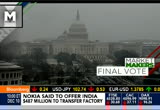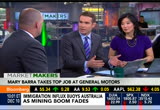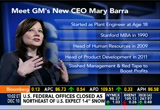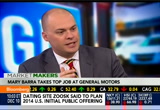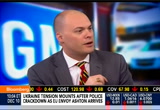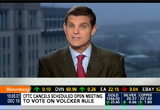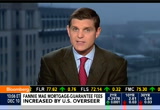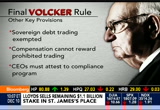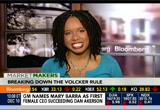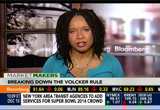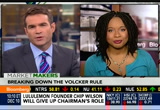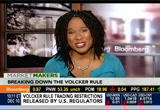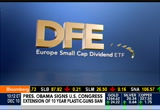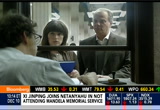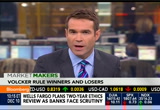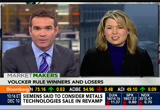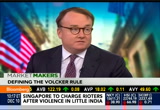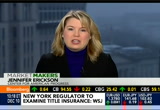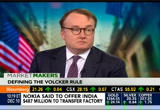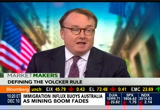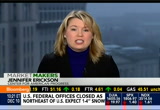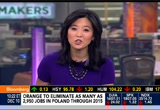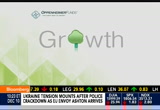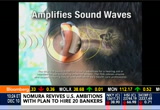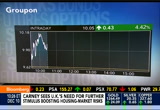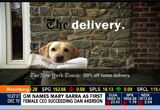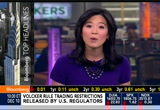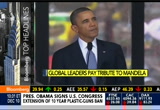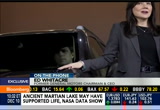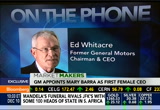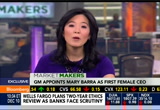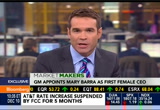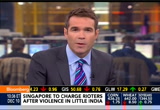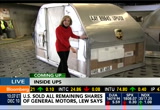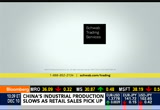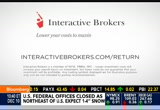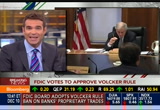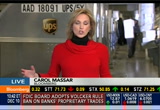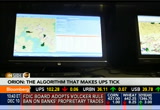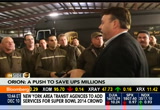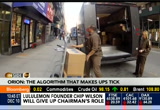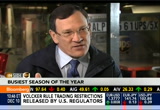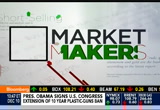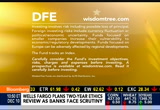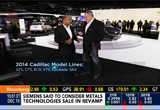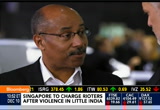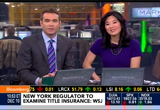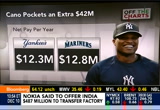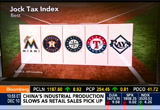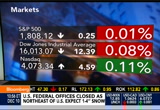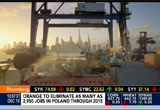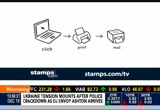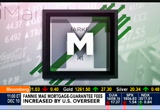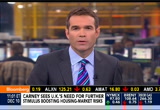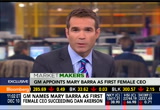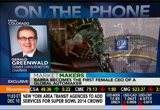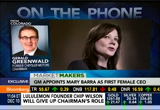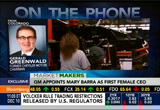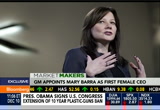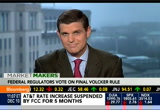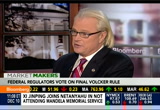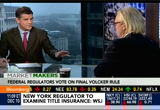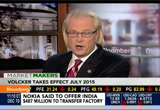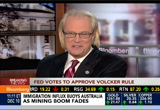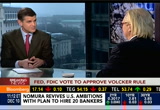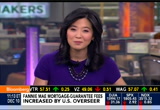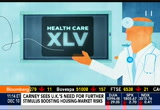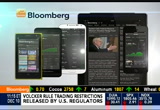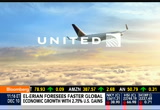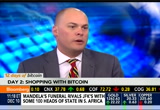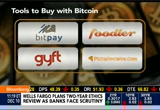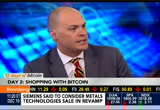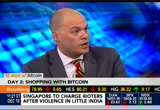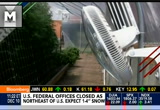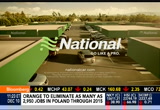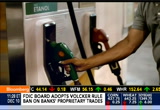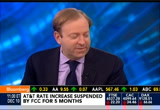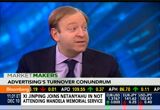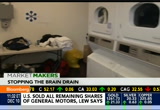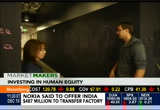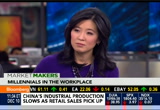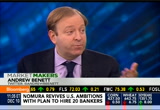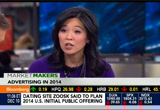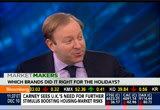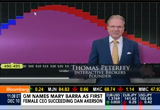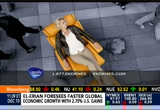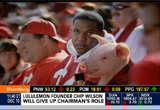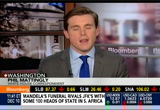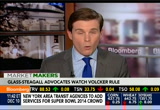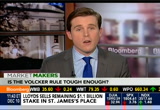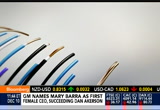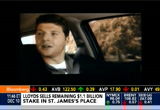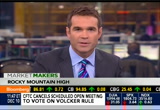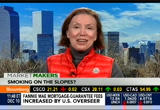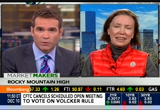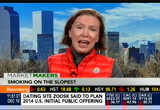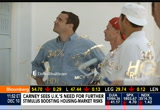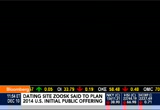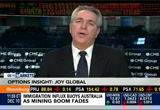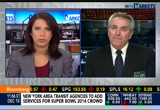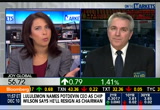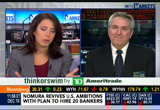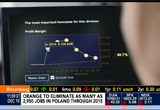tv Market Makers Bloomberg December 10, 2013 10:00am-12:01pm EST
10:00 am
♪ >> general motors, his replacement takes the reins of gm, the historic moment, you will hear from the former ceo, who talks to us exclusively. final votes, no shock, d.c. regulators, braving the storm, finally passing the volker rule. wilbanks find away way around the new restrictions? the biggest shipping
10:01 am
date means a flurry of activity for brown. we go inside ups to see how the utility -- the delivery giant handles it all. good morning, everybody. you are watching "market makers." i am erik schatzker. >> and i am scarlet fu. >> we are beginning with a huge development in detroit. general motors is naming their new ceo, a story that bloomberg broke. she will be one of the first women to lead the automaker. .esterday that the 65-year- old would not stay for much longer. tell us about mary barra, she has been there for 30 years? >> her entire career. she started as an intern in one of the plants, starting as a plant manager, running
10:02 am
manufacturing, briefly in charge of hr as she -- before she took over as the first female in charge of products for an automaker, now the first woman to run an automaker around the world. ands an incredible story the interesting thing will be to see what i first heard on the news this morning, how the other guys react who were perhaps in line for the job. a lot of people were perhaps expecting mark royce. he is a serious car guy and also an engineer. studied electrical engineering before getting her mba at stamford. resume, stamford, head of manufacturing, really just a second pat, head of product in 2011. her real calling card, slashing , tryingnt redtape costs to taper what gm does while still building cool cars to make more money.
10:03 am
>> let's go back to the other candidates. mark royce was not the only contender. there were at least two more? >> stephen gursky was in the running, he is head of your -- european operations right now. a thankless job. cfo was also seriously considered. have ae to basically background in finance or a background in engineering to run a detroit carmaker. those are sort of the gold standard. has the engineering pass. >> thing about detroit now, she kind of stands out, especially a woman, in this industry. >> it is interesting, her father works there as well. it is interesting, dan ackerson, i remember what he said a couple the detroito -- all carmakers are run by non-car guys, but someday a car gal will
10:04 am
run one of these companies. think about it, they are. he has no automotive background to speak of, or engineering. alan mulally is an engineer that comes from boeing. she really is the only car guy in town and it just so happens that she is a woman. >> matt, thank you very much. our own auto expert, matt miller. you have spoken to her? >> a number of times. one of the things that she said to me that stuck with me ever since, when the new corvette was launched, it was the most important car of 2013 and i thought it was amazing that you could get the car were such relatively little money and i thought about getting it myself but she said to wait until the camaro comes out, that it was a better track car. she said that they had designed it to be a weapon on the track. >> anyone who doubts her
10:05 am
credentials can think of that conversation? >> the 1928, she is responsible for that. >> at 10:30 this morning, an exclusive interview with the person who put her in charge of , at whitaker, they helped to lead the company out of bankruptcy. >> we will be returning to this story shortly, but the other top story today, washington, a snowstorm shut down the government, but banking regulators are still hard at work. the volker rule will be ushering in a new era in banking business. peter cook has been covering the years long process that finally culminated today inuvo. will wall street be happy with the results? we know they have been pushing back for the last couple of years. >> the banks hated it from the start, they will not like it anymore today, and they will not at -- and they will especially not like this tougher version.
10:06 am
after three long years of debate even among the federal regulators who have to implement this rule, on wall street and in washington, they believe it is finally done. the rule, first conceived by paul volcker, designed to reduce risk in the financial system by specifically banning banks from trading from their proprietary accounts from the first time, limiting bank investments to hedge funds and private equity. banks will not like the final hedging investment language, that probably stands out the most. they must show that hedging the mitigates one or more specifically identifiable risk, meaning hedging, like the london whale trade. those are not allowed. her must be specific risk that is being offset. more news on market making, their bread and butter business, trades must not exceed the reasonably expected near-term
10:07 am
demands of clients, which is pretty broad and it remains to be seen if regulators and thanks agree on what reasonable and near-term might be, it is that kind of enforcement that is so important going forward. they are all expected to adopt the rules in the next hour or so . there will be some no votes in the mix, some regulators who think that this rule goes too far, but this is a victory for those pushing for tougher rule. >> any other curveballs in the final vote? >> a couple of specific things that are new wrinkles based on what we saw, sovereign debt trading will not violate and will be exempted, a relief to europeans in particular. there is talk about compensation packages in your. that would seem logical. bankers are going to want to read the language carefully. they must the test in writing place,pliance program in but more importantly they do not
10:08 am
have to attest that the compliance is actually happening, which is a much lower bar than some on wall street had feared would be put in place and one of the reasons that this has gotten more latitude than they expected. >> thank you for the rundown. peter cook, bloomberg television's chief washington correspondent. >> nilo richardson worked at the cftc while regulators there were trying to write the rule. she is now a senior economist for bloomberg government. is this -- let's put it this way , the regulators want us to believe that this is a strict volker rule, stricter than wall street wanted. give us your assessment. >> the first thing that regulators need to do is rename it the diamond rule, that is the only part of the statute regulation that has any teeth, the hedging part. the idea of tying every risk to every trade will surely throw compliance offices around the country and in these tanking
10:09 am
divisions into a tailspin. how do you do that? how do you tie specific risks to trades that come directly from the jpmorgan debacle? that is going to be the real teeth of this regulation. areou are saying that those the real teeth and perhaps the only teeth. why is it that the rest of the rule, in your opinion, has no teeth? >> you have to think like a lawyer to understand this eerie of the more vague the rule, the easier it is to get compliance lawyers scared enough to make sure that they draw their own bright line about what his trading, hedging, and market making, and sometimes that is the intent on vague regulations. you want the compliance divisions within the banks themselves to set the terms. rights what this sets up now, giving banks a lot of leniency to draw their own bright minds and it will take a
10:10 am
lot of time for banks and regulators to come to terms on just how to interpret this language. >> a lot of it will depend on the regulatory environment that the banks are operating under as the economy improves. will that situation be better for banks as they attempt to figure out the rules of the road? >> absolutely it will be better for banks when the economy improves, but remember that part of that improvement will be an increase in interest rates. >> how do they hedge this risk going forward? that will be a crucial problem is the federal reserve begins to taper. as the economy improves, they will be competing with other obstacles, hedging the improving economy based on their portfolio that they have now. >> cast your eyes into the future. we are being told that the volker rule will not be enforced for another year.
10:11 am
the president announced it back in january of 2010 and banks have been responding since then, suspending their prop trading desks. in 2015 how different are things going to be from the way they 2009?n >> first and foremost, metrics will matter. that is the only way that regulators are going to be able to distinguish prop trading from market making to tying hedging to specific and identifiable risks. banks are already comfortable measuring risks on a daily basis , now they are really going to have to step up their measurements of inventory, because that matters in determining market making from prop trading and turnover of inventory as well. these metrics will determine how forcibly the enforcement will follow. hard to findo be baselines right now, there is still an element of prop trading in all banking activities, so
10:12 am
finding a baseline in particularly ill liquid markets will be very difficult. >> so much for resolving all the confusion. nilo, thank you very much. really set the scene for us. the new day for american banks is here, but there is still a raging debate and we will your from both sides, pro and con, next. >> ups does the math, a new algorithm saving the package delivery service millions. you are watching "market makers," on bloomberg television. ♪
10:15 am
10:16 am
prop trading, in other words making bets with shareholder money. the challenge was writing a rule that prevented banks from gaming the system by dressing up the trade as something else. making sure that clients still get the services they need and financial markets still have enough liquidity to function properly. here to assess the winners and losers in this tug-of-war, director of competitiveness and growth at the left-leaning center for american progress, and here in new york, richard works with many of the bank wall street firms. lesbian with you. we have not seen the final rule until this morning. balancestrike the right between safety and soundness on the one hand, presumably what paul volcker was after in the first place, and the competitiveness that american financial markets required to attract capital? which is part of what made this country, or at least this city, in any case, the world's financial capital?
10:17 am
>> thank you so much for having me. i actually have not seen the final rule yet, i have been stuck in this snowstorm in washington, d.c., but i have been reading a lot of the same reports as you and i expect to see a stronger vocal rule -- volker rule than we found in the 2011 draft, which i think is a good thing. i do not think it will stop banks from being competitive, but i do think it will safeguard the financial system. >> richard, your take? hurt thek it will competitiveness of banks, how could it not? when you have other banks who are not subject to the restrictions of hedging on trading, they can provide capital cheaper to their clients more effectively, how can that not marginally hurt effectiveness? >> perhaps marginally is the point, perhaps marginally is enough. regulation through a certain
10:18 am
lens is just raising the bottom of the glass. the more freedom you give the banks, the more trouble you might have. >> you have to look at the trouble that cause the issue that gave rise to all of this. of course, it was never prop trading. no one has been able to identify a single bank that has gone under because of prop trading. that is the context that all of this needs to be kept within. >> the contention that prop trading did not lead to the financial crisis of 2008, 2009, the volker rule tries to address that had on, but it prop trading was not to blame, how far do we really get? >> there were many causes of the financial crash and prop trading, i think, absolutely destabilizes the financial markets. there is the conversation about what makes the banks more competitive, going into another financial crisis will absolutely hurt bank competitiveness. to what degree prop trading played a part in the last crisis
10:19 am
is not the entire issue. the question today is -- what part could it plan the next crisis? obviously both reagan leaders and legislators have that concern and it is something they're trying to guard against. >> because it is prohibited at banks, i think you think that those people are going to go to new hampshire and raise cashmere goats, you are giving -- you are fooling yourself. who is going to provide the leverage loans to do that? the banks who are prohibited from having those operations in that prohibitive environment. it is very questionable if systemic risk is reduced at all by what we are doing. >> let's take that off the table for a moment, what about the cynics among us who expect that the very least banks to find the to get around specificity of these rules? that is part of what makes wall street so competitive, right?
10:20 am
>> research wherever it can be found, they will be doing something else as well, searching for congress to cut overon this, like they did 30 years of glass-steagall. the question is, alternately, where is the bond rating going to be set? we do not even know what the volker rule even means yet. the language is not very specific at all. how you determine the reasonable near-term expectation is security. >> that is vague. >> hedging against a specific identifiable risk? what does that mean, at the end of the day? like a duckt walks and talks like a duck, it is a duck. >> who determines what a duck walks like and talks like? >> all five regulatory agencies. >> i think of what is important here is we have smart regulators who have the resources to do the
10:21 am
job. you are absolutely right, we cannot have congress starving them from the resources they need to do it. the bottom line is you can take it from the gao, take it from the fed, the last crisis cost us into the trillions and americans have still not made their way back. i fundamentally reject the premise that what makes us more competitive is letting banks do whatever they want. top hole on the street and that is not what the public is expecting from regulators in 2013. >> paul volcker, the rule bears his name, says the spirit of wall street is what he is trying to change with this rule. five years from now, what will this culture really look like? >> that absolutely remains to be seen. one of the most interesting parts of the rule will be how ceos adapt to it. they have a role in making sure that there programs are compliant. a lot of people like myself that hoped that it would go even
10:22 am
farther. as they said, the rules are necessarily a bit vague. that is why i hope that we see ceos taking the spirit of the rule on board. >> what about reinstating glass- steagall, then? >> if the volker rule is not seen as strong enough, not enforced strongly by regulators, i think you will see even more growing support from republicans and democrats on the hill for that, and i understand that, but the most important thing right now is making sure that we understand the rule and making sure that regulators can enforce it. >> jennifer, richard, we have to leave it there. thank you both so much. makers," up on "market general motors makes history, for the first time a woman will run the company. we will be right back with our
10:26 am
>> we are approaching 26 minutes past the hour, time for bloomberg to go on the markets. kind of a mess today. the major indexes are off just slightly, coming on the heels of the 39th record high for the s&p 500 this year. >> incredible. >> in the absence of any news, let's keep moving stocks higher. , upne stock rising today almost 4.5%, groupon is making promising progress and he thinks the shares may rise to $15 by 2014, higher than they are now. they have doubled year to date
10:27 am
10:30 am
>> live from bloomberg headquarters in new york, this is "market makers." >> welcome back to "market makers." i'm scarlet fu in for stephanie today. >> we have lots to cover including jim whitaker, the c.e.o. and chairman. >> the new c.e.o. at g.m. it hasn't been formally announced. >> it has been. we broke it earlier. >> it's not a bloomberg exclusive. these are the top business stories around the world. changes at the top. chip wilson steps down as chairman of lululemon.
10:31 am
and portevan replaces christine day. lululemon had to recall from sheer yoga pants earlier. black fish criticizes sea world for the way performing whales are treated. three music acts have been canceled -- they canceled concerts at sea world park. willie nelson, heart and bare naked ladies. they call black fish a dishonest move. in johannesburg, leaders around the world joined with south africans to mark the life of nelson mandela. it was at the biggest soccer stadium and was the first of three events this week. president obama was among those paying tribute. >> we will never see the life of nelson mandela again. but let me say to the young people of africa and the young people around the world you,
10:32 am
too, can make his life's work your own. >> general motors made history today as we were just telling you, naming mary barra the c.e.o. of the company after dan ackerson retires in january and will be the first woman to lead a global automaker and will be doing it right after the u.s. government exits its massive financial stake in g.m. the former c.e.o. of general motors was credited for turning the company around and is on the phone with us for a bloomberg exclusive. thank for you taking time-out for "market makers. let's talk about mary barra, you were the c.e.o. when she was put in human resource in addition to her role in manufacturing and engineering. at that time in 2009, ed, did you see her for a candidate for c.e.o.? >> sure, mary has a lot of tagent -- talent and experience and very personable and did a terrific job in the human
10:33 am
resources function of general motors. of course. >> what was it specifically about her, and continues to be about her, that makes her the kind of leader general motors needs right now? >> well, mary is very experienced. she's very good with people. she has an excellent experience working with people and knows general motors backwards and forwards and has been there quite a while and had all the attributes necessary to be a great leader. >> ed, what does she do to keep rk rust, dan ammon and steve gersky, all considered contenders for the position that may just leave now that they've been passed over as c.e.o.? >> i can't answer that because i've been gone three years. they're all very highly qualified people. they're terrific people. i don't know how the process went, but it went as it did and mary is a good pick.
10:34 am
>> but at the very least, ed, let's ask you this, is there a risk that royce or ammon or gersky will leave, that g.m. will experience a g.e. type situation, that the frontrunners or at least the other contenders for the job are going to look for greener pastures elsewhere because everyone acknowledges they're so capable? >> i think you better ask them that. i don't know. i've not talked to them recently. i have no idea how it went. i just don't know the answer to that. shoe talk to them. >> ed, i wonder now the government has sold off its stake in g.m. and is now is a completely shareholder run company, what will mary barra's biggest challenge be? >> i'm sorry, i didn't understand you. >> what will mary barra's biggest challenge be in running general motors now the government is no longer a shareholder in the company? >> i'm certainly glad the government is no longer in it.
10:35 am
g.m. has some good momentum. the financials have been good, the product is excellent. she'll have to continue that momentum and that will be a challenge for her but she'll be up to it. >> you saw general motors from the inside, ed. what's the most difficult part or aspect of running this company, the things that mary barra herself is about to confront? >> well, it's a huge company and has a lot of moving parts. it's a very competitive business. you have to have really good products and have to keep them coming. she'll have to balance all those balls and continue to go forward. i think they're doing great. i think she can continue that. >> ed, she's been credited as one of the people driving this move to a smaller number of platforms, the idea that g.m. will have only, say, 10 basic cars on which it will build its global suite of product. is that the right approach,
10:36 am
whittling it down to smaller platforms? >> i really can't answer that either because i don't know their plans over the last couple years. but she's certainly involved in all of that and if that's the decision that's been made, she certainly has been an integral part of that. >> ed, one thing that's interesting here, of course you ran several telecommunication companies before you took on the top role at general motors, an akresoe nimbings and so did maloli. mary is from the car industry, does that background work for her or against her? >> i think it will work for her. i think it's very beneficial to have that background. >> ed, we thank you very much for joining us. the former chairman and c.e.o. of general motors, ed whitacre, is credited for turning the company around while under bankruptcy protection. we'll have more on the g.m. story naming mary barra the new c.e.o. gerald greenwold is the former manager at chrysler and knows
10:37 am
the auto business inside and out. >> we'll look forward to that conversation. once she does take over next month, mary barra will join a number of female c.e.o.'s, mong them whitman of pepsi and irginia rometty of i.b.m., marissa player of yahoo!, and ilene ronfeld of mondelez. >> we go inside the largest packaging service with u.p.s. what is on the menu? >> these are containers that u.p.s. moves the goods around that go on the planes. pretty heavy, 500 pounds empty and two tons totally loaded. check out the floor here. there are all these things with rollers that make it easy to move. check it out. and no, folks, i'm not getting
10:38 am
10:41 am
> breaking news, everyone, the federal deposit insurance corporation is the first to officially pass the volcker rule. the final version we saw earlier this morning with a unanimous vote. we're still waiting for the four other bank regulatory agencies, the s.e.c., the fed, the o.c.c., and scarlet, i'm mitsing one, the cftc. the ctfc canceled its vote because of a snow day in washington. all it takes it 3-5 inches -- >> it was working before it began falling.
10:42 am
>> perhaps they were shamed into it when the other agencies said they'd vote, the cftc said we'll vote electronically. we're waiting for the four others to vote on the volcker rule and will be put in action and the enforcement beginning in 2015. moving from volcker to this, everybody. all day today we're taking you inside u.p.s., the world's biggest packaging delivery company this year sbrounsed orion, a system that crunches data to save a fraction of a mile on a driver's daily route. our chief correspondent carol masser is at world port, u.m.s.'s hub in louisville. let's talk about it. why is it such a big deal because a fraction doesn't sound like much. >> you're right but if you add the fractions of a mile especially when you have so many drivers driving so many miles it potentially adds up to savings for u.p.s. this company has been working on orion for more than a decade and basically the u.p.s.
10:43 am
softwarer ining came up with a algorithm that works with the physics of the driving right. >> this is the orion, the algorithm that makes u.p.s. tick. >> algorithm isn't something you expect to hear. but orion is changing the delivery. >> we're the trucking company that had the technology. the truth is we're a technology company that has trucks. >> orion is a program 10 years in the making. its objective is to find the fastest, most fuel efficient way to get packages to your doorstep. >> with 120 deliveries on a driver, there's more ways to service those customers in a number of nano seconds it has been in existence. orion is looking at a trillion of things in four second. it will run 200,000 different alternatives and it's going to say here's the best way to deliver. >> each truck has over 200 sensors that monitor everything drivers do from turning on the
10:44 am
vehicle to unloading boxes. all of that fed into the mathematical equation that prioritizes such variables as distance, time, traffic, and cost. >> our goal here wasn't that we would dramatically grow efficiency by doubling and tripling, it was trying to take a look at some small gains, but on our scale, small turns out to be rather significant. >> its culture of efficiency has a storied past. starting with the company's first delivery car, a model t ford in 1913. 11 years later, u.p.s. built the first conveyor built system for handling packages. >> did morning, everyone. good morning, everyone. >> this year it's orion. >> rear here because of orion. >> how is orion a game changer for u.p.s.? >> by the end of 2013 we'll only have a portion of our fleet deployed and orion will already save a million and a
10:45 am
half gallons of fuel. orion will adjust on the fly so the leave building time changes in 10 minutes, we run orion, here's your new plan. >> when we think u.p.s. we don't think technology we think oracle or google. >> i'm sorry but being google maps are not accurate for a u.p.s. driver. >> you're better than google maps? >> absolutely. we have a world class i.t. group many people don't know about that makes magic here. >> so orion is being introduced about 10,000 of u.p.s.'s 55,000 drivers here in the u.s. there's a whole new rollout by 2017. here's a number to throw at you guys. once the program is rolled out by 2017, if you shave off just one mile off each driver's route, you're talking of savings of $15 million. it's kind of a law of big numbers with the law of averages here. those numbers a fraction of a mile but start to add up for
10:46 am
u.p.s. >> carol massar looking good in brown. don't let anybody tell you it isn't the new black. talk to me about the holiday season. people have a lot of christmas shopping yet to do even though this holiday shopping season is the shortest one we've seen in a long time. what does u.p.s. expect out of it? >> yeah, exactly. they're definitely seeing volumes up compared with last year, eric. i caught up with the company's chief financial officer earlier today at the hub. they've talked about what they're seeing this far in the holiday season. check it out. >> this shopping season between thanksgiving and christmas have six less shopping days. what typically happens when the calendar is compressed like that, you see much more on a daily basis. so we expect our average volume between thanksgiving and christmas will be up about 8% on a per-day basis. >> so last year you had your busiest day, i think it was four million packages either december 20 or december 21. do you think you guys might
10:47 am
break that mark? >> there's a good chance of it. i think in the busiest day here in world port which is our global air building, we'll process over 3.5 million packages in this building alone. >> all right. so the c.f.o. of u.p.s., kurt kuehp. coming up at 3:30 the c.e.o. is scott davis will be with us. >> our own carol massar at u.p.s. all day long. she's taking you inside the company. >> when we come back, the seattle mariners hitting a home run by signing yankees free agent robinson cano but it's cano who hit a grand slam when it comes to saving money on taxes. that's coming up in our "off the charts "here on "market makers" streaming on your smart phone and tablet and also bloomberg.com. ♪
10:50 am
10:51 am
to revise the cadillac brand which hasn't led the luxury segment since 1996. jeffrey haslet went to the auto show to talk with the vice president of global design, ed wellburn, to find how the how he and his team have shed the perception that luxury cars for your grandparents. watch. >> here here at the l.a. car show. is this like the prom for you? >> i wouldn't consider it the prom. i mean, it's kind of like a traveling circus. >> i'm looking around on the floor and this doesn't look like my old man's cadillac. in fact, this cadillac behind me which is a designed one looks more like the cadillac i'd buy after his second or third divorce as a guy, right? >> we're having a lot of fun with cadillac. i have to tell you, we have more cadillacs under development today than any other time in the 110-year history of the brand. it is that good. >> when i look at the brand, bankrupt company, bankrupt city, doesn't wreak of luxury
10:52 am
brand anymore. what are the tough challenges for you? >> the challenges are many. one is time. we don't have time. in the customers in the market, they're not going to wait for us to do the right thing or do the right vehicle. they're not going to wait three years, four years, five years. >> how many years do you have? >> we need to move fast. >> there are certain gaps that we have in our portfolio that we need to fill with the right product. >> is this one of the gaps right here, this big muscle car? >> that is one of the gaps. i'd love to see that car in production with el mirage, we've evolved the design language. it has more shape to it. it's a very different proportion. we'll continue to move and evolve the brand. can't stand still. >> what was it that caused you guys to say look, we can't do it like we used to? we can't be our dad's cadillac? >> we had to look in the moiror and see what the challenges were and get out of detroit and really take a look at the whole industry. i think during the darkest days
10:53 am
-- >> which were when? >> during bankruptcy. >> every day you'd hear the terrible headlines and i brought the team together, the entire design team, and i talked about how we're going to get through this bankruptcy. and we come out the other side, everyone will want to look at where we are from a design perspective. >> how do you measure at the end for a design team success? >> it's a lot more than a pretty picture or a pretty car. we're not designing this to hang in the museum of modern art. we want people to purchase it. it's got to be that kind of compelling design that connects with people on an emotional level that they've got to have this vehicle. >> make sure to watch it tonight at 9:30 p.m. eastern and pacific right here on bloomberg television. >> yankees star robinson cano is moving out to seattle. the mariners offered cano a 10-year, $240 million contract that's quite a bit fatter once you consider the tax treatment, like any smart finance guy
10:54 am
should. scarlet, you have all the details in today's "off the charts." >> it's important to note this deal hasn't been signed yet but seattle offering that $2040 million contract with the yankees' best offer which was seven years, $175 million. new york had the better offer on a per annual basis but baseball players get taxed on where they play, including away games rather than where they're based. so he saves on taxes by playing for seattle. >> a lot on taxes. >> a lot. he pockets an extra $42 million in annual taxes by paying for the mariners where he would pay about $504,000 a year versus more than $2 million if he stayed with the yankees. what does it mean in terms of net pay? well, net pay per year under the yankees' offer would be $12.3 million. with the mariners, $12.8 million. >> it changes everything. >> it certainly does because that means the net pay over the contract life for the mariners worked out to $128 million for 10 years whereas for the yankees, again, the best offer they made, $86 million for
10:55 am
seven years. $42 million more. you can buy a lot with that. >> which other team -- clearly, working in seattle isn't so bad after all. >> no. >> which other teams offer a good tax deal? >> robert raiola was telling us that in fact the teams you want to play for, those based in seattle or texas because texas also doesn't have a state tax treatment. and based on the 2013 schedule, he created a jock tax index. and miami marlins, houston astros, seattle mariners, texas rangers, and the tampa bay rays are the best teams to play for. in terms of the -- >> that makes sense, florida is why king james went to miami. >> texas, florida, and washington. take a look at where you don't want to play if you don't like paying taxes and you're a baseball player. >> surprise, surprise, california, the top of the list >> san francisco, san diego, oakland, l.a. dodgers, and the anaheim angels.
10:56 am
the l.a. angels. this is provided to us by a.p. consulting. this jock tax index was cal could lated based on the 2013 schedules. it's telling. you get the glory when you play in california. >> how about new york city? >> you get a lot of grief. >> if you play for the mets. >> and for the yankees. just ask a-rod, right? >> it's approaching 56 minutes past the hour. time for bloomberg's "on the markets." we'll take a quick look at the major indices and show you how things are shaping up today and you'll see that they're not really shaping up to be a whole lot different from yesterday. >> no. not a lot of economic data that's significant to follow here as everyone still tries to figure out what the tapering schedule of the federal reserve will look like, whether it will take place in year in december or early next year. certainly that's something to keep an eye on. we do have retail sales numbers coming out later on this week that will make a big difference in how people perceive it. >> and tomorrow all we get it nba mortgage applications.
10:57 am
11:00 am
♪ general motors shifting gears. for the first time ever, gm names a want to be ceo -- a woman. what can you buy with a virtual currency bitcoin? >> a real rocky mount and high. concerned about the new law letting people smoke marijuana just for the fun of it. this is "work it makers -- in new yorkrs"
11:01 am
11:00. >> hilton is speeding up the timetable for its ipo. they will price after the market tomorrow instead of thursday indicating strong demand from investors. it was bought by lack stone in 2007. deadline day for states that boeing build the new 777 jets. a front contender. a rare cease-fire between leaders of the u.s. and cuba. president obama shaking hands two raul castro, the attending the state service for nelson mandela. >> we have her on the phone from colorado, the former and chairman of chrysler, jerry greenwald.
11:02 am
berra.alk about mary did you know anything about her as she was making her way up the ranks to gm? i knew a lot about women in the auto industry. i don't know her very specifically. she's been through all the .hairs at gm they've done the right thing picking a really wonderful, very strong ceo. picked based on gender. they picked on who they thought would carry general motors on for the next five or 10 years. >> is that the right move? the company when they were put in bankruptcy protection. he says mary knows the company backwards and forwards. put her in charge of hr at
11:03 am
the time. ed whitaker came out of the telecom business. is this the right time for gm to return leadership of this automaker to someone who actually grew up that the company? >> both gm and ford have been run in the post downturn from people out of other industries like at ford, alan mulally. they've done very well in a tough time. gm has been smart about hedging their bets a bit. , the newicized chairman of general motors is an experienced veteran industrial person who was the ceo of
11:04 am
cummins engines. i think he will be a real plus >> i want to ask you about mary .erra in competitive organization over at gm. which will be most important national takes general motors on to compete against the toyotas, hondas, fords of the world the? >> i just described it this way. a long time ago, i used to think the auto industry was the most competitive in the world when i was in the industry and i thought it was self-serving. i've been in five industries overtime and i'm now in private equity, greenbrier. the auto industry is in fact the
11:05 am
toughest in the world. the biggest race going on is technology. who comes up with the best powertrains with the lowest fuel burn? inrefore, i think experience r&d, engineering is really critical. the new challenge for safety and high-tech convenience, all combined, it's really critical. as is true motors, for other auto companies, they are trying to achieve what i call worldwide cars. a leader that started all of this was toyota. you buy the same car the same name whether or are in the u.s., europe,
11:06 am
japan. it gm is a bit behind. in my opinion, they are challenged to get there. that are the challenges mary will have and i think she has the background to do it. it, itway you describe makes it sound like being an engineer is a plus, especially an engineer who has moved up through the ranks, in this case general motors. there have been a number of ceos , but to what degree is that a strike against her? >> i will put it this way. she worked in what i will call the before general motors and after. my hope and expectation is that
11:07 am
she has learned from the failures of gm in the past and what it takes now to be nimble, not be bureaucratic, and to compete head-to-head with some very tough competitors going forward. >> gerry, thanks. jerry greenwald, former ceo of chrysler. he's been in five industries over the course of his career and auto is the toughest. story, andr top it's taken three long years but this is finally a reality. regulators braving the storm to get a final vote on the controversial rule and peter cook is standing by with one of the regulators who pushed for a tough bulger rule, cftc chairman. take it away. >> i'm joined by commissioner chilton.
11:08 am
you braved the weather. the fdic has just voted procedurally and you expect the cftc vote will happen? >> we are in process. the file around and we sign at all one by one. i anticipate we will complete the vote sometime soon and my prognostication is that it will pass with enough votes. >> this is a volcker rule that you like. you think the end result is a right balance between enforcement and allowing wall street to do with the day-to-day business? >> absolutely. it's sort of a shocker. i spoke here a few weeks ago and i could not imagine how much of this rule had been weakened. the draft i look at two and a half weeks ago but thankfully, it's rigorous and strong and i'm very pleased. it does a lot of good things, the full intent of the law.
11:09 am
>> how is this strengthened from what you saw two and a half weeks ago to today specifically in the area of hedging? >> that's a key issue. banks are prohibited from entering into speculative bets. what the law requires, what the rule requires now is that there has to be a correlation analysis. there has to be a correlation between the risk and the hedge. if the hedge loses money, a la london whale, or they become speculative, it has to be recalibrated and correlated with the underlying risk. >> that was not there two and a half weeks ago. >> and people who are out there now saying this rule will do this and that, they could not have made those statements two
11:10 am
and a half weeks ago so i'm really pleased that they changed. >> the rule has been toughening up. which of the five agencies led the way he? do you expect that regulator to take the way in setting the tone and enforcing the compliance of this law? the way on this hedging provision that we were just discussing. this is a key thing. we are not the banking regulators. .e are derivatives regulators we do know hedging. this was a key provision of the volcker rule. if you got this wrong, it was not worth doing. we have been the lead on that provision and a few others with regards to market making and with regards to compensation winked to highflyer bets. we prohibited that in this rule. you can go ahead and make your
11:11 am
hedges, but your compensation cannot be geared upon that to reward the high flyers out there. they should not get bonuses based upon that. prohibition. to prohibit is a strong word. as with every rule, the devil is in the details. are you confident this eliminates any gray area that wall street firms, like goldman sachs for example, or a more diversified institution like amorgan can use to disguise prop trade as a hedge or a market-making activity? >> you've been around the block. of course they will find loopholes. they have a year-and-a-half before this thing is even implemented and they're going to be looking at these gray areas with a fine tooth comb. one of the things that i'm warning people about is that this rule must not remain
11:12 am
static. we need to be on it. we may need congress ultimately to come in and change things if they found a way is to do things that this law prohibits. >> we are waiting for the wall street banks and their lawyers to take a look at this with a fine tooth comb. what is rebello confidence that can stand the legal challenge down the road? of the controversial aspects of dodd-frank have found their way to court. >> if we go to court, that means we did a good job. we are a litigious society. people can take us to court. this is totally defendable man does with the law suggested. >> let me ask you about one aspect that came up late, compliance. as i read the rule, it shows that the ceos have to attest that they have a compliance program in place and its functioning but they don't have to sign off on the notion that they are compliant.
11:13 am
the distinction is important, isn't it? a wholeiance means litany of things. i might list every individual thing and have them initial in a home mortgage good signing off on compliance means they are having a good review of this, good enforcement of what they are doing internally and if they don't, we will go after them. >> you think that is assuming responsibility for compliance? >> 100%. chilton, perhaps your last major active cftc commissioner so we appreciate you joining us. back to you. >> we do want to mention the fed board has voted to adopt and we are waiting on three other agencies, the sec, the cftc and the last. going on a shopping spree with bitcoin? you may be surprised with what you can buy with the new digital virtual currency.
11:14 am
11:17 am
>> you are watching "market makers." 10 to talk about some "bloomberg west" headlines. they will bring their current staff with them to the new website. this is according to people familiar with the matter. kept the. cap the -- allthingsd website. zoosk has picked bank of america to lead the official public offering.
11:18 am
they have 3% of the online dating market making it something of a bit player after something like eharmony. >> we're learning a little bit more about it going. lately, plunging, rising, plunging again. we decided to celebrate the 12 days of bitcoin. one bitcoin for $800 and today you went shopping. soared.rice action has it plunged one sam sort of cracked. it ined to talking about figures of single, double, or triple digits and now it went to $1200 for a few days. we are still looking at a $900 and change valuation.
11:19 am
that said, i thought there would not be many things i could buy with it. the >> are you living your life funding by bitcoin? >> everything for the next two weeks with the extent of mine rents, my fuel provider. food, what i wear, entertainment. it's not as difficult as i would have suspected. a number of tools let you spend bitcoin from the consumer or the merchant side. there, i'm going to eat lunch with foodler. coins.ay, pizza for they hope the consumer to buy things. ft, you can buy from any number of retailers and bitpay
11:20 am
helps on the merchant side. bitcoin.l not accept >> obviously you're not buying a model s right now. >> not with my big coin -- b itcoin. >> how do you deal with the volatility? worth as much be tomorrow as they are today. asay it has traded as low 800 $64. >> i bought mine for $800 and it has not fallen below that. $864.ded as low as value is eroding faster than the venezuelan currency. >> there are a few sensational drops, but if you look at that charts, it's up, up, up.
11:21 am
>> the lamborghini dealer in california that took him a i cannot remember how many, as payment for the tesla and at the time the transaction to place they were valued at 100 $3000 and a few days later it was only $70,000. $103,000. >> when you use bitpay or coinbase, you just get paid in dollars. for take the risk out of it you. they give you the dollar when they get the bit coin. >> who is holding the bag? who's assuming the risk? it will be the times these companies like coin base, act by fred wilson -- backed by fred wilson, or they can spread the risk out. we are trained to
11:22 am
think about the assets in terms of the value, investment, and how it moves. the community around bitcoins thinks slightly differently. they are thinking about it from a technology side of things almost as an art form and they give it away. >> i want to know if they're going to do a 12 days a bit coin. >> i will and i will watch. talking aboutt, the south american country about to adopt a new strategy in its war on drug legalization next on "market makers." ♪
11:26 am
>> on the verge of becoming the first country in the world to legalize the sale of marijuana and that is today's latin america report. they're expected to approve legalization today. they say it's a cheaper more effective way of funding the war on drugs and it would allow pharmacies to sell as much as 40 grams of marijuana a month to registered users more than one gram per day and the government would set prices. a lot of the drugs will end up on the black market, those opposed say. that is today's latin america report. the marijuana economy coming up on "market makers." colorado.of a collection make for an interesting winter. can a barehand have too much
11:27 am
11:30 am
>> live from bloomberg headquarters in new york, this " with erikmakers schatzker and stephanie ruhle. >> advertising has a problem -- the brain drain. more than 30% of the industry's employees turn over every year. it's a major concern for the president of one of the world's largest ad companies, and he has written a book about how to fix this. the foreword to this you might notice was written by bloomberg's on justin smith. why is this happening? >> if you look at the advertising industry, the
11:31 am
marketing services industry, it has been happening for decades. isare an industry that driven by ideas. we are a creative industry, so people need to find stimulation anywhere and everywhere they can -- >> hang on a second. there are lots of industries all about ideas and all about creativity. just look west of silicon valley. there's lots of that going on here as well. yet, you do not see 30% of employees cycling out of any one company in a given year. >> it's also a fairly incestuous industry. people know one another, and there's limited players. i think silicon valley is an interesting parallel to draw. there are people moving from one company to another within silicon valley. in our industry, it is higher, and it's also the way people move around. it's a broader theme that we see in what is happening with talent , whetherlent economy
11:32 am
it's the same industry or different industries, to collect experiences. >> when you see this kind of turnover within the advertising industry, are people going off to form their own companies the way they do out west, or are they simply moving around within the advertising industry world? >> you have a few things going on. the first and greatest agree is people moving within the industry. you define the industry or you need to as broadly as possible as marketing services. you could work for an advertising agency one day and quasi-technology communication start up the next day. we do see more today people leaving the marketing services or advertising industry to go to facebooks or the kind of text silicon valley -- tech silicon valley companies. that is a big drop. >> for your book, you interviewed leaders at companies
11:33 am
like facebook, for example, zap, zappo's, andbes -- others. what did they tell you? >> one of the most interesting insights that was very surprised for me was the range of sopanies we interviewed was fast, everything from dow chemical to exxonmobile to google, facebook, you think they would be very independent and there were remarkable similarities. the most important one in terms of why people stay and what makes people successful is the net -- the notion of cultural fit. companies aremore recruiting for today, making ise they spend a lot of time the notion of cultural fit, do they live and believe in me -- in the culture of the company. and it's a two-way street.
11:34 am
it's not just if a person fits with a person fits with the company, but whether the company fits with the person. >> there's a lot of talk of the rise of the millennial's. they've been in the workforce for couple of years. what's your impression of this generation based on the conversations you had with executives of different companies, and how do they influence the way companies operate now? >> the first point on millennial s is it's broader than a demographic. it's a mindset. a lot of the attitudes they have, wanting to have more feedback, viewing the work lace as needing to be more of a meritocracy than one in which tenure is valued more than what's you contribute -- more than what you contribute -- those are core values and had seeped into the broader workplace. if you look at some of the best- performing companies to date, those are values of those companies. on the positive side, they are helping to make the workforce a better, more productive place, where people are more turbocharged.
11:35 am
a challenge is that they are more demanding. they do look for more, and that is the flipside. you tend to hear more negative the on millennials in workforce. you've seen the statistics -- by 2025, they will represent close to, depending what economy you're talking about, 75% of the workforce. we need to understand what makes them tick and how to motivate them. >> my experience covering wall street has made me a hardened cynic. every bank, every financial services company you speak to want to to believe the same thing -- culture, the fit, how you feel about working here is the most important thing. at the end of the day, the -- at though, the truth the end of the day, though, the truth is compensation. >> it is underreported. we have seen year-over-year, it is dropping. when you ask employees, whether it's the labor department or studies we do ourselves, with the prime reason for why you come to a company or stay,
11:36 am
cultural fit, working with the book that i like are growing in importance, and compensation is lessening. it generally ranks right now around third or fourth. very few people will say the number one thing is how much they get paid, but i do think it is a trend we do see where more and more people even beyond want to work for a company where they share the values, where they feel its dynamic and going places, where when they interview, they feel its people they want to work with. >> we have to bring the conversation to your wheelhouse, which is advertising. we are nearing the end of the holiday shopping season. lots of concern that it's a halt -- a shorter holiday shopping season than in the past. >> i think it is a real. i mean, we saw a drop in black friday spending. part of it is i don't think there's anything today -- i
11:37 am
don't think we have a black writer today. black friday, cyber monday, it has all been blurred. on saled has become essentially after halloween. there's a lot of backlash. you have all seen the good list and bad lists for who has their workers go to work on thanksgiving and at what time. i think it will be interesting to see whether that trend continues in terms of a reduction of volume spent on black friday. i think with regards to holiday in aing, we still live consumer-driven society. consumption is kind of growing again. we did see a few years where there was more thoughtfulness around consumption. i think that was driven largely by the economy. >> that trend is over? >> the pendulum is swinging back where people are a little more comfortable making discretionary purchases that they would not have been comfortable making before, money aside.
11:38 am
11:41 am
critics likedustry the volker rule because it attempts to rein in the industry , and it may stop some of them that requires commercial and investment banks to be split up. a white house correspondent is with us now. to what extent is the glass- steagall talk all a moot point now? >> it will be interesting to see. there's cautious optimism for the groups that are considered anti-wall street, those that have been lobbying hard for a restrictive volker rule. they like what they have seen.
11:42 am
they feel like there have been good changes. that said, there's a lot of stuff moving on capitol hill. one more big loss, like a jpmorgan loss, and maybe this stuff kicks up again. >> there have been bills from democrats that would go further than the volker rule. what has been really interesting is talking to some of these anti-wall street advocates over the last couple of days. they've made very clear that the volker rule came out and was filled with loopholes. they would redouble their .fforts they are going to go after them. i don't think they are unhappy with the volker rule. though, they are not going to stop. they are angry with what happened in 2008, and if they see an opening -- one does not necessarily exist right now, but if they see an opening, they will absolutely take it. they do not feel like. franklin are enough -- they do not feel
11:43 am
like. frank -- they do not feel frank went far enough, clearly. >> there are still people working to get this glass- steagall 2.0 past, but who else is listening? >> it's interesting. it's kind of a "compared to what" kind of scenario. compared to wall street, they do not have a lot of influence. that said, before 2008, these groups never existed. americans for financial reform, better markets, public citizen groups like that never really got involved. now they are getting close to meetings with regulators. they are getting audiences with key lawmakers on the banking committee pretty much whenever they want to. they are an important voice, d i think they are won over the last few years you have seen come out of nowhere and matter. that's important, especially
11:44 am
when you are going up against the wall street juggernaut. the fed andte -- fdic have approved a final version of the volker rule. we are working for three other regulatory agencies to give it their stamp of approval. >> when we come back, why resort operators in colorado are saying, "if you want to get high, do not get on a ski lift." they are not happy with the state's new marijuana laws. we'll explain. ♪
11:47 am
>> i'm erik schatzker. you are watching "market makers ." marijuana is not exactly new to ski slopes ofthe colorado, but now that pot is legal in the state, a colorado gearsy offering pickups and providing all you can smoke marijuana on a bus ride up to the lift is called colorado highlights, and it's the main of -- the bane of the existence of a not for -- the ceo of a not-
11:48 am
for-profit organization representing colorado's ski industry. good morning. what exactly is wrong with a little rocky mountain high? >> i think what people need to know is that the new law in colorado does not legalize the use and consumption of marijuana in public places. ski areas in colorado are public laces from top to bottom, from the parking lot to the lift to the lift lines to the trails to the patios. it's all public areas, and smoking marijuana is not legal under the new law in colorado. >> it might not be legal, but people have been doing it and will continue to do it. there are wooded areas or smoke shacks where people can tuck into if they feel like it. how did you go about enforcing this? >> i think colorado ski areas are ready for this law to go into effect on january 1. ski areas have been dealing with
11:49 am
rule breakers their entire existence. they have a number of tools in their toolbox for doing that. we also work closely with law enforcement, which is mostly county sheriffs in colorado, and ski areas in colorado are all by the on land owned united states forest service. they also have law enforcement also havevice -- they forest service law enforcement officers, so we think we will be ready to implement the new law. >> is it possible that the legalization of marijuana will bring more people to the state to ski? i have seen the data. there are fewer people skiing. would you not want any reason to the powderpeople to of colorado? >> i don't know that, but i do know this -- visitors to colorado ski areas can expect a family-friendly atmosphere and safe slopes. ski areas are public places in
11:50 am
colorado, and the new law is very clear that public consumption of marijuana is not authorized. >> also not authorized his drinking and skiing, but plenty of people drink during lunch or when they go into the resort for a few minutes, tuck into warm-up . how does smoking marijuana and skiing -- how is that worse than getting drunk and skiing? >> what is not authorized is being impaired when skiing. inp at a lot of places colorado since 1979 that prohibit skiers from skiing while impaired -- we have had a lot of places in colorado since 1979 that prohibits gears from .kiing with impaired >> your constituents, the ski resorts themselves and operators, will have to spend more money policing the resorts to make sure people are not either choking under the canopy or in the gondola or out behind the back -- toking under the
11:51 am
tokingor any -- under the canopy or in the gondola or out behind the back of the chalet. >> what a lot of people do not know is that public consumption of drugs is not authorized. there is no gray area. we are going to be very vocal and continue to do so in our public education. >> very quickly here, i know you are trained as a lawyer. there are resorts that are ski- do not allow snowboarders. would the law allowed for a no- smoking, no-drinking resort? >> we actually do not have any areas in colorado that do not allow snowboarding. snowboarding is welcome everywhere in colorado. smoking is prohibited in colorado ski areas, so visitors can expect a family-friendly
11:52 am
11:54 am
11:55 am
the volker rule being passed today with this man, former ceo of wells fargo. a bloomberg exclusive. you will not want to miss it. is 50the meantime, it minutes -- 56 minutes past the hour, which means bloomberg is on the markets. joy global reports earnings .omorrow break it down for me, here. you do not think the stock is necessarily going to move as much as the options market is pricing it, correct? >> what i'm looking for is a trade that will be neutral to the market with a very limited risk, with an unlimited upside. what i want to do here -- the expected move here is about three dollars. i think that the stock will stay within that expected move. whatt to go ahead and sell
11:56 am
expires three days from now, and i can sell that for about three dollars. hopefully, we will bring some joy to traders with a little christmas present right after christmas. i'm going to buy the exact same straddle for two weeks from friday, so hopefully, what we have here is a maximum risk of about $.80. however, if the stock stays within the expected range, we will make more. if we get it too close around 57 on friday, we have a chance or unlimited rewards, so it's a real small, low risk trade, a holiday trade that hopefully will bring some joy. worrye not a lot to about. we have a chance for limited risk with an unlimited reward of who knows what once we get through this friday. >> i'm a little confused. it sounds like you are -- the optimal idea would be for the stock to at x per he would be at $57, but then why is the re-ward unlimited -- why is the reward
11:57 am
unlimited? >> the 57 straddle i have sold expired, which is worthless, which means i own the call and put for two weeks from friday, which means that anything can uppen, so the stock could go $20 or down $20. it gives me unlimited risk, unlimited re-ward. either side it goes once we get through this friday's expiration . >> if $57 as the optimal price here, the last time the company came out with earnings, they disappointed. customers are a little wary this time. demand from clients has been challenged. that's what happened last time it reported earnings. why might we not see a bigger move, especially to the downside? >> you could. the stock seems to put in a real myspace at $55 -- a real nice
11:58 am
base at $55. i think the way it has been trading, its insurance as well. let's say the worst-case scenario happens and we have a big move to the down sign. our maximum risk here is still only $.80. our goal is to be in the stock with a neutral bias, hoping it $59 stay somewhere between and $54. if it stays at $57, we have a chance to make a lot of money. the chart looks ok, and i do not expect a major move. if it disappoints or makes a big rally, we will end up losing 30 cents or $.40, but the maximum trade is still only $.80, no matter what happens. >> thank you very much. global earnings also a belt whether -- also a bellwether, so we will be watching that.
11:59 am
let's look at what is going on with the stock market. after a two-day rally, a little bit of a pullback today. not a huge one, but the s&p and the dow both off by about .25% as we approach the midway point in our trading session today. we will be on the markets once again in 30 minutes' time. "lunch money" is next. ♪
12:00 pm
"> welcome to "lunch money where we tie together the best videos, stories in today's news. there will be someone new in the driver seat at gm, and it will be a first in the global automotive industry. will talk about it. on wall street, the volker rule is about to become the new reality on banks. we are about to go inside ups, the biggest shipper of packages in the world. in world -- celebration nelson mandela as the world says goodbye on a high note. in the wild card, 12 days of it going -- 12 days of bitcoin.
198 Views
IN COLLECTIONS
Bloomberg TV Television Archive
Television Archive  Television Archive News Search Service
Television Archive News Search Service 
Uploaded by TV Archive on

 Live Music Archive
Live Music Archive Librivox Free Audio
Librivox Free Audio Metropolitan Museum
Metropolitan Museum Cleveland Museum of Art
Cleveland Museum of Art Internet Arcade
Internet Arcade Console Living Room
Console Living Room Books to Borrow
Books to Borrow Open Library
Open Library TV News
TV News Understanding 9/11
Understanding 9/11
